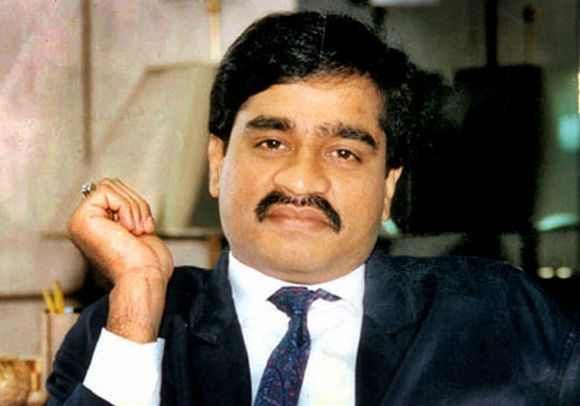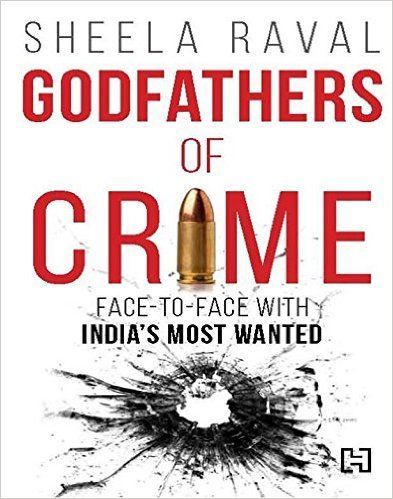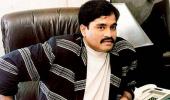'After Rajan is back in India, our resident dons are almost down. I won't say that they are out. So, now the obvious question is about Dawood, and the present government, I think, is more than willing to address that issue.'
'I think the political system made this kind of people; the corporate world made this kind of people. I have mentioned in my book that even the banks were using these outlaws to get their money back.'
Sheela Raval, author of a new book on India's gangsters, offers rare insight into their lives and times.

Journalist Sheela Raval's Godfathers Of Crime: Face-to-Face with India's Most Wanted gives a glimpse into the lives of gangsters like Dawood Ibrahim, Chhota Shakeel, Abu Salem, Chhota Rajan, Arun Gawli among many others.
The book delves deeply into how some of these gangsters fled abroad and built billion dollar empires, hobnobbed with global terrorists, international drug cartels and intelligence agencies of various countries, compromising themselves and exposing them to be used as pawns by these agencies.
In a freewheeling two-part interview with Prasanna D Zore/Rediff.com, Raval says, "A good journalist should read the signs," when asked how Chhota Rajan's arrest will affect Dawood Ibrahim.
Ask her about what made her take the risks that she took in her three decade career in journalism, Raval says, "(It was the ) typical Gujarati mindset... that if I fail, it will be a huge learning, but if I get any success on the way then I'd have hit the jackpot. I feel I was lucky. But there was huge struggle and pain."
The interview at a cosy restaurant in Delhi's Khan Market on the coldest day so far in the capital this year.
Why you felt like writing this book?
During the course of my career after I would break stories about the underworld, people had so many questions. 'How did you go about it? What did you do? How did you make contacts? Why do they trust you?'
These kind of questions were always asked of me. I thought of answering all these questions.
The other reason is there is nothing that explains or throws light on how these gangsters' lives changed after they escaped to foreign shores. I tried to put every piece together to draw a bigger picture.
That Dawood Ibrahim was known to Mumbai and the media is a different personality than what he has evolved into, a global terrorist. There are many nuances to the stories of these gangsters which were missed out by the media during reporting.
I was very surprised when he was designated by the United Nations as a global terrorist. The obvious question to me was why was the UN was interested in Dawood and what did he do to deserve that tag.
This had many international nuances and a curious me began to delve into these questions and my book has tried to answer these questions.
Are you satisfied with the way the book has shaped into?
Mostly. There are many things which I could not verify, so I couldn't have written about them.
Like?
If I was to tell you that, I could have very well written it in the book. I will write on it in due course of time. I believe that if a truth exists in this universe it gets verified one day in some or the other way. I am waiting for that time.
Do you have a sequel in mind?
You won't have to wait for long.
See, after Rajan is back in India, our resident dons are almost down. I won't say that they are out.
So, now the obvious question is about Dawood, and the present government, I think, is more than willing to address that issue, in whichever way.
My journalistic instinct tells me that, sooner or later, I would get to see or hear or tell the news about Dawood's logical end.
To India?
I said logical end.
Are you saying he would be physically eliminated?
That could be anything. You may ask me questions, but I am not an astrologer (laughs). It is very wrong on my part to even predict anything.
You have written about corporate houses and mentors of gangsters in your book without giving a hint as to who are these corporates, businessmen are or who these mentors of Dawood or Chhota Rajan are....
Again when I say this today... see I can give you names which I have heard, but that is not a verifiable fact. So, it would be very inappropriate to name names here.
But I have given one example of mill owner Sunit Khatau. You know what happened to him. He actually made (Arun) Gawli. He used him. It is like riding a tiger. If you can't control the beast, then he eats you. The same thing happened to Khatau.
So Gawli is one example. You also saw what happened to Thakiuddin Wahid (East West Airlines) and in Mumbai in that decade, the 1990s, there were many such examples.
When people were killed and died in the crossfire, which meant they had something to do with them (the gangsters). Which also means somewhere they could have also been involved.
I think the political system made this kind of people; the corporate world made this kind of people; I have mentioned in my book that even the banks were using these outlaws to get their money back.

Did these corporate houses you mentioned in your book exist today and have grown by leaps and bounds post India's economic liberalisation?
Yes, they exist even today. Very much.
And are these the marquee names that we know of today?
I wouldn't say that now (laughs).
But let me tell you what Iqbal Mirchi told me. That he (Mirchi) began his journey as a police informer at the (Mumbai) docks. He also told me how the big bullion traders of Mumbai were hand in glove with these (gold and silver) smugglers. They avoided custom duties; they avoided all the taxes.
Many times, they would make these dons steal their own goods or consignments and claim insurance for that. This worked on commission basis, which ranged between 5 per cent and 25 per cent depending on the value of the goods.
I have every reason to believe him (what Mirchi told her). Imagine a person whose traditional business was selling chillies on a small roadside shop in Byculla market to a person who I met in London, who was living in a huge mansion, with a swimming pool and a huge backyard. Can you imagine his journey? So, I have no reason not to believe what he told me.
If he weren't a smuggler, he wouldn't have travelled so far.
You have interviewed so many gangsters in your career. Who among them did you find the most fascinating?
Nobody fascinated me, but I was intrigued.
By whom?
By many of them. Imagine their killer instincts; the way they travelled so far despite being from poor families, almost all of them -- and I have no sympathy for them when I am saying this -- but I would just imagine the kind of instincts they would have had and reach a level where now they are dealing with the international financial system, dabbling in foreign currency counterfeiting, allegedly printing currencies of various countries; they have been charged with printing dollars, drugs smuggling. So, sometimes I keep thinking about their driving forces... what must be ticking them?
That is the only thing that intrigues me even today. When I wanted to meet Dawood very much, not to listen to his fairy tale story or about his bravado and exploits... he is human at the end just like you and I.
I have seen them; they talked to me; I could feel they were emotional. Mirchi talked to me with moist eyes because he introduced me to his grandchildren and he knew that he would never ever get the kind of dignity.
He longed for it?
All of them. That includes even Dawood. I am sure because when I asked (Chhota) Shakeel once, 'What do your children think about you?' he said when they were young he would try and keep them away from the media and this kind of publicity and exposure but now they have grown up and they understand. They understand the reality and the circumstances that led them to choose the path they did.
I am sure they -- whether it is Shakeel, Dawood or Rajan or anybody for that matter -- long for it (dignity).
What makes Rajan call himself 'patriot' time and again? He could have helped (the Indian government), possibly, but that does not mean he doesn't have a bloody past. He worked with Dawood till 1994. So, he has the same bloody past.
In short, he deliberately wants (people) to forget his sins and criminal past. In his mind he is supposedly justifying his bloody deeds by calling himself a patriot.
This applies to all of them. I think I saw in all of them a very, very humane side. They all know they have a past, they know their present and they know their future -- they know some day they might even meet a very bloody end themselves.
But all of them, from Ashwin (Naik) to Dawood to Shakeel or Rajan or even Mirchi, have their children as doctors or engineers or professionals.
Dawood supposedly rules over a $6.2 billion empire, but still wants his children to study.
Deep within, are all of these gangsters broken men then?
I assume that. This is my perception after meeting them. I really wouldn't know what they think of themselves, but this is what I perceived after interacting with them.
Now, we have gangsters like Chhota Rajan, Arun Gawli and Ashwin Naik calling themselves or thinking of themselves as 'patriots' or 'Hindu dons'. Are these three dons now also 'Sarkari dons' just like Dawood is now the 'ISI's don'?
No one should forget that they (all these gangsters) have been used. Period.
By the system?
Whoever. By powerful people.
By politicians?
I said powerful people. They could be bankers, financial people, corporates or the government or politicians. They could be anybody.
All I am saying is these dons are mere pawns who are being used. They are used by people who are on the right side supposedly, of the law, or people who are operating within the parameters of the legal system.
Now, if these dons are not patriots, then they could be terrorists.
Will the government now make maximum use of Chhota Rajan in going after Dawood and his network in India?
Let me tell you that 'government' is too powerful a world. You are giving too much mileage to Rajan by saying that the government would get information (about Dawood) from him.
I don't underestimate the Indian government.
You are saying that there is nothing that the government wouldn't already know what Rajan does?
Absolutely. What makes you think that Rajan would help the government? I don't think that way.
Won't Rajan help unravel Dawood's assets in India, his financial network or business deals?
It might have happened in the past when he just parted (ways with Dawood in 1994). He could have given (then) a first-hand account of what he saw. But beyond that government has its own resources, its own agencies and their international counterparts. So, I refuse to believe that any gangster can help the government.
And please quote me on this. It is necessary for people to understand that the government is a very, very, powerful entity.
But there are lots of grey areas. It is not either/or. And I am very surprised when my own professional colleagues are using such logic in case of Rajan or any other gangster 'helping the government'.
I think when we do this we are underestimating our own government. And we shouldn't. India is a big country. India is a powerful country. No matter which government is in power.
Are you saying that the government knows how deeply entrenched Dawood's financial interests are in India and yet they are not taking any action against these power groups?
They are taking action (against Dawood and his financial interests), I am sure.
Whatever can be done has been done is being done.
When you are exchanging your files and notes with the American government and international agencies you know much more about any gangster than any other gangster can ever tell you.
These kind of outlaws, who are being used by powerful entities across the globe, are under constant surveillance. Otherwise, Headley (David Coleman Headley, the accused in the 26/11 terror attacks) would have never been arrested ever.
I am under no illusion about this. I live in the real world and I know how this real world works. So, it is very wrong and juvenile to say that gangsters can be helping the government.
Yes, one thing is sure -- that they could be used to reach out to the other person.
Are you suggesting that through Chhota Rajan the government may try to reach out to Dawood?
Rajan is dead meat now.
Are you absolutely sure that Rajan is not one of those 'deep assets' for India?
No. There is a grey area. I have no reason to believe that, but in 2000 (the year when Rajan was shot in Bangkok) I had reason to believe that because of my experience in Bangkok, which I have mentioned in the book, told me otherwise. But then I didn't know much about the undercurrents of the underworld's relation with (intelligence) agencies.
This happened in a third country. It didn't happen in India and when you get to see a different picture... I mean I could never imagine an assassin sitting in the police commissioner's office and giving an interview to a journalist. And that happened in Bangkok.
It was a different scenario, in a different country and I was exposed to a different of truth and system and I realised that...
Did the Indian government help Rajan escape in 2000 from Bangkok?
I have no proof to say this. I would say this only if I have some verifiable facts and just circumstantial evidence cannot be suggesting that.










